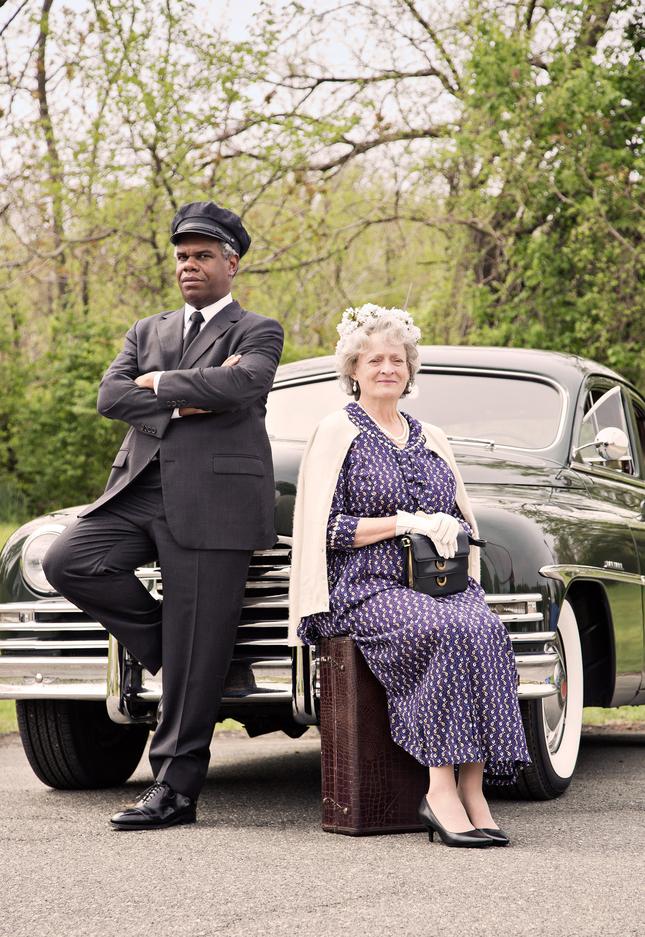The space—a bare room with a table and chairs, no decorations on the wall in the Shakespeare Theatre’s rehearsal studio near Eastern Market—seems the ideal setting for an interview with Nancy Robinette. She is here to rehearse her role as Daisy Werthan in the Ford Theatre’s upcoming production of “Driving Miss Daisy,” which runs from Sept. 26 to Oct. 26.
She’s still in the middle of the rehearsal process and there’s a certain clean slate aspect to talking about a play you haven’t seen yet, and which isn’t totally locked in yet for the actress.
“One thing I’ve discovered is that the play really holds up well. I was really pleased to see that,” she said. “I think it has a lot to say about how we deal with race and prejudice, not just in the play’s time setting, but for us and how we live today.”
Playwright Alfred Uhry won a Pulitzer Prize for “Driving Miss Daisy,” which starred Dana Ivey and Morgan Freeman, with Freeman eventually reprising his role in the movie version with Jessica Tandy. Julie Harris and Brock Peters were in a touring version and in 2010 the play was revived on Broadway with James Earl Jones and Vanessa Redgrave.
The play revolves around widow Daisy Wertham, a retired Jewish school teacher in her seventies living in Atlanta in the 1960s. Her worried nephew has hired Hoke Coleburn to be Daisy’s chauffeur after she’s caused a car wreck. The play becomes a time-spanning saga about the relationship between a prideful, stubborn woman, who has experienced prejudice herself, but is deeply set in her ways, and a recalcitrant, proud black man. Theater-goers watch as they try to overcome their initial feelings about each other and experience the civil rights struggle taking place around them.
Robinette, one of Washington’s theatrical gems and treasures, is working with longtime Washington actor Craig Wallace. Jennifer L. +Nelson is directing the season opener.
“I think while the film was lovely, it was almost too naturalistic in its physical details,” she said. “We’re working with suggestion as far as the noise and reality of history is concerned. I think one of the things that occurs in the play is that both realize that they’ve suffered in the South and been outsiders. But this isn’t just about racial issues, it’s also about class. Daisy, in many ways, will not change because she’s from an upper class family where you didn’t do certain things and say certain things. I want to get into her strengths and her independence, which she’s losing because of age.”
Robinette had only recently finished starring as Winnie in the Scena Theatre’s production of Samuel Beckett’s “Happy Days.” “That was my first Beckett,” she said. “You’re immobile through the whole play, buried halfway up to your neck in sand, reminiscing, trying to be alive. You have to figure out a way to connect to the audience.”
“You know, Robert (McNamara, the artistic director and founder of Scena Theatre) is one of the most under-appreciated theater artists in this city.”
We had talked several years ago when she starred with Kimberly Schraf and Holly Twyford in “The Carpetbaggers’ Children,” another Southern-resonant play by Horton Foote.
She remains careful in what she says, and how she says it, an approach you suspect she uses in dealing with her characters to do them justice and get them right. This comes across as caution and reticence at first, but after a while, you discover she has a gift for listening and watching so that at some point in the interview we start swapping theater stories and people stories. She has a knack for encouraging that sort of thing—tales of Beckett, other actors, other plays, her life in the theater, arrived at and built with some caution. “I couldn’t really say I was an actress full-time until I could give up my day job.”
When she came to Washington more than 20 years ago she studied with Studio Theatre founder and artistic director Joy Zinoman, which was a transforming experience. “She was my great teacher and mentor,” Robinette says.
During the course of our conversation, I began to feel as if I knew her.
And in many ways, I do. I’ve seen her on stage many times, have spent two-hour chunks of my life over two decades with her at the Studio Theatre, Woolly Mammoth, Shakespeare Theatre Company, Arena Stage and at other venues. I been able to watch her build a life, reputation and career. She has won three Helen Hayes Awards, including one for her role as Florence Foster Jenkins in “Souvenirs” at Studio Theatre.
Actors have a way sometimes of becoming totally immersed in their parts or bringing some unique and special quality to them, to create what the late Tana Hicken said were “transformations.” Robinette brings a voice, a kind of kinetic quality that’s all-at-once trembling and vulnerable backed by a tensile, but warm strength. Put her in tall, restoration wigs, floating-ship dresses for Shakespeare or Wilde, and she can make you laugh until it hurts. In spite of the formidable echoes of other Daisy Werthans that exist—Harris, Tandy and Redgrave—you can be sure that Nancy Robinette will make Miss Daisy her own.
“Driving Miss Daisy” runs at Ford’s Theatre Sept. 26 through Oct. 26


